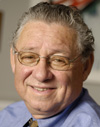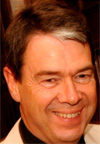|
|
6. Centre for Advanced Research and Development of Alternative Methods (CARDAM)
| Key note lecture |
 |
Bjorn Hansen
EU, DG Environment, Chemicals Unit
E-mail: Bjorn.Hansen@ec.europa.eu
Bjorn Hansen obtained his Masters degree from the State University of New York at Stony Brook, New York, U.S.A. in 1985 and his Ph.D. in 1988 from the Technical University in Eindhoven, the Netherlands.
After a “habilitation post” at the Geog August University in Göttingen, Germany, he joined the European Commissions Joint Research Centre in Ispra, Italy, in 1991 and has been work area co-ordinator for the team working on existing substances (Reg. 793/93) in the European Chemicals Bureau from 1993 to June, 2003.
In June, 2003 he joined the Chemicals Unit of DG Environment in Brussels, Belgium were he is Deputy Head of the Chemicals Unit.
He was seconded to the European Chemicals Agency as Director of Operations for a year starting in September 2007. |
| Theme 1: New promising methods for the replacement and reduction of animal tests |
 |
Alan Goldberg
The Johns hopkins University, USA
E-mail: goldberg@jhsph.edu
Alan M. Goldberg, Ph.D. is Professor of Toxicology and
Founding Director, Center for Alternatives to Animal Testing (CAAT) at the Johns Hopkins University, Bloomberg School of Public Health.
Alan M. Goldberg received his Ph.D. in pharmacology from the University of Minnesota. After two years as an assistant professor of pharmacology at Indiana University, he joined the faculty of Johns Hopkins University.
He has been a professor of toxicology in the Johns Hopkins School of Public Health since 1978 and Associate Dean (1984-99).
In 1981, Dr. Goldberg established the Johns Hopkins Center for Alternatives to Animal Testing (CAAT), and he served as its director through 2008.
He is a leading authority on the creation, development, and validation of alternative toxicological methods and has served on numerous committees for national and international organizations charged with protecting public health.
He is the recipient of many awards, including the inaugural Russell and Burch Award in 1991 from the Humane Society of the United States, the Society of Toxicology's Ambassador of Toxicology Award in 1998, the Society of Toxicology's 2001 Enhancement of Animal Welfare Award, and the 2001 Doerenkamp-Zbinden Foundation Award.
He is the author of more than 150 scientific articles and editor of numerous books. |
| Theme 2: Validated models and test methods |
 |
Joachim Kreysa
/
E-mail: Joachim.Kreysa@ec.europa.eu
Dr. Joachim Kreysa joined the Commission, DG XII (Research) in December 1985. Since then he worked in 10 years in research management, followed by 5 years as scientific secretary of the Scientific Steering Committee (the SSC of SANCO) that advised the Commission on BSE and similar highly sensitive matters, including overseeing the validation of BSE tests.
Thereafter he was in development project management in DG AIDCO and recruitment in DG ADMIN until in 2005 he joined DG ENTR for setting-up the European Chemicals Agency in Helsinki, the centre-piece of REACH, the new chemicals legislation of the EU.
When the Agency (ECHA) started in June 2007, he joined the team of Commission officials that were made available to get it off the ground and as Director for Cooperation he was responsible for setting up and running the REACH-Helpdesks and preparing guidance for industry, setting-up the Agency's scientific committees, and creating the communication unit of ECHA.
Since 1.11.2008 he heads the In-Vitro Methods Unit of the Institute for Health and Consumer Protection of the JRC and is also responsible for ECVAM. |
| Theme 3: New concepts for integrated test strategies for hazard and risk assessment |
 |
Russell Thomas
The Hamner Institutes for Health Sciences
E-mail: RThomas@thehamner.org
Russell Thomas is a senior investigator at The Hamner Institutes for Health Sciences in the Division of Computational Biology.
He is the Director of the Center for Genomic Biology and Bioinformatics at the Hamner Institutes.
His current research interests focus on the development and application of genomic technologies and bioinformatic tools to toxicology and chemical risk assessment.
Dr. Thomas completed his M.S. in radiation ecology and Ph.D. in Toxicology at Colorado State University. Following his doctoral studies, Dr. Thomas performed postdoctoral research in molecular biology and genomics at the McArdle Cancer Research Laboratory at the University of Wisconsin.
Prior to coming to The Hamner, Dr. Thomas worked in the biotech and biopharmaceutical industry.
Dr. Thomas is a member of the Society of Toxicology and was recently awarded the Society's Achievement Award. |
|





